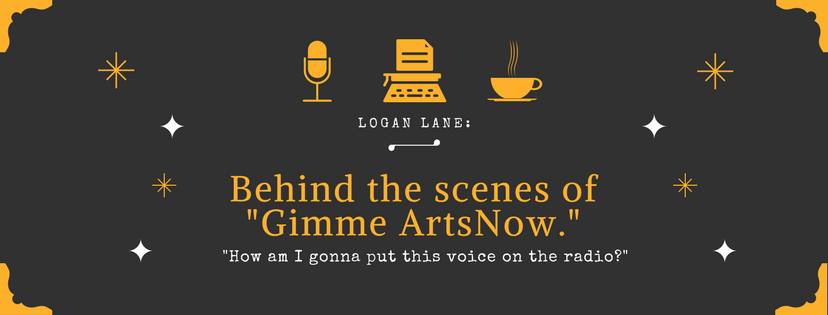
Behind the Scenes of “Gimme ArtsNow:” The Interview
Hey, I’m Logan Lane. I’m the summer intern for ArtsNow. For the next month-and-a-half, I’ll be working with Roger Riddle to create a new podcast series called “Gimme Arts Now.” Each episode will feature a different Summit-based artist, venue, organization, and patron. This blog will show you what goes on behind the scenes as I learn what kind of work goes into each episode.
In the last post, I explained that the first episode of Gimme ArtsNow would be focusing on the literary arts. At that time, we managed to contact and secure interviews with Akron author David Giffels and the Queens Council on the Arts (QCA) in New York City. Roger took the QCA and I got the chance to talk to Giffels.
So here’s how it went:
I walked into Giffels’ office a few weeks ago with five questions jotted down in my notebook. Roger told me that you want to shoot for an interview that is about twice as long as the intended length of the segment. So, for a 10-minute bit about Giffels, we’ve gotta jaw around for twenty minutes. Which comes out to about five questions, plus a gimme (anything else you want to add, sir?).
 Roger briefed me on the tools of the trade a few days prior. It was a lot simpler than I expected. I ended up walking into the interview with a pair of headphones, a small digital recorder, and a notebook. It reminded me of my stint as an editor of The University of Akron’s student newspaper, The Buchtelite. But there’s a world of difference between using someone’s words in a textual context and using their voice in an entirely auditory context.
Roger briefed me on the tools of the trade a few days prior. It was a lot simpler than I expected. I ended up walking into the interview with a pair of headphones, a small digital recorder, and a notebook. It reminded me of my stint as an editor of The University of Akron’s student newspaper, The Buchtelite. But there’s a world of difference between using someone’s words in a textual context and using their voice in an entirely auditory context.
For starters, this interview felt less like a conversation than the other interviews I’ve done. You need good, clean audio for the podcast, so you can’t laugh or say “I know what you mean” or really do anything to show you’re engaging the subject except nod and smile. The interaction becomes an evaluation of how many ways you can mutely show the person across the mic that you’re following along. Twice I nearly laughed. Once I actually did, which you can hear on the recording. A few times, I tried to throw in a follow-up question or ask Giffels to clarify something while he took a pause, but I caught myself. The whole situation was a little stressful.
I don’t want to spoil the upcoming episode, so I won’t get into the specifics of my questions and his answers. But I can tell you two things. First, we got on the subject of writing groups and he told me a little about his own writing group… called the Butt Wranglers. (I thought it was called the Butt Ranklers at first and I really wish it were). This name tickled Roger and I. When I told Roger about the Google Drive folder that my friends and I use to workshop our own writing (it’s called The Goat Rodeo), he laughed. I think there’s just something about writers (or maybe all artists) that makes them need to be chest-thumpingly strange.
Second, Giffels told me about his own writing process. More specifically, he told me how important it is for him to view this process as work. But why read about it when you can just listen to it? Check out the video below:
There’s not terribly much I can say about the process after the interview. Once I had the raw audio on my computer, I had to listen and transcribe the entire thing—which was grueling.  Then, Roger taught me how to use Adobe Audition to cut up the audio and put the different pieces together in a multi-track. He showed me how to clip and edit so that the transitions sound clean. We recorded an introduction together, and then I recorded some narration for the Giffels interview. Then, after all of that, we sat down to listen to the finished piece, and it was both jarring and exciting to hear my own voice (which up until now I’d expressed only in writing) out there in the radio world.
Then, Roger taught me how to use Adobe Audition to cut up the audio and put the different pieces together in a multi-track. He showed me how to clip and edit so that the transitions sound clean. We recorded an introduction together, and then I recorded some narration for the Giffels interview. Then, after all of that, we sat down to listen to the finished piece, and it was both jarring and exciting to hear my own voice (which up until now I’d expressed only in writing) out there in the radio world.
Be sure to check out the episode when it comes out this Wednesday morning!